China Celebs
China’s Celebrity Weight Craze: Qin Hao’s Viral Diet and Body Anxiety Behind the Weight-Loss Trend
The extreme diet of Chinese actor Qin Hao has sparked a trend of people sharing photos of their corn and egg meals. It’s yet another celebrity weight-loss trend that is more about unrealistic expectations than healthy ways of shedding pounds.
Published
1 year agoon
By
Zilan Qian
Actor Qin Hao’s remarkable weight loss has sparked waves of online excitement over a potential new diet plan. Qin is not the only Chinese celebrity whose weight loss journey has become an online hype. But behind the relentless pursuit of celebrity weight loss plans lies the issue of body anxiety, particularly among young Chinese women.
Why do we see so many photos with one ear of corn on Weibo these days? It has everything to do with Qin Hao (秦昊). The actor, renowned for his role in the highly acclaimed 2020 Chinese drama series “The Bad Kids” (隐秘的角落), has recently garnered significant attention for his appearance in another compelling series titled “The Long Wait” (漫长的等待).
This time, his surge in popularity is not just because of his exceptional acting abilities or the captivating character he portrayed, but mostly because of the remarkable diet plan he followed to lose weight during the filming of the series.
In his latest role, Qin played a middle-aged man with a chubby physique, round cheeks, and a beer belly. He had put on a lot of weight to play this character. However, later on, the director asked him to quickly lose weight and “sharpen up” (“必须瘦出棱角”).
Qin’s wife, Yi Nengjing (@伊能靜), discovered an online diet menu that helped Qin successfully lose over 20 pounds, resulting in a significant transformation in his appearance. Due to numerous inquiries from fans and followers, Yi decided to share the diet plan on her Weibo account.
The five-day diet plan consists of the following meals:
Day 1: Only unsweetened soy milk is consumed throughout the day.
Day 2: Each meal consists of one ear of corn.
Day 3: Breakfast includes dragon fruit, lunch consists of an apple, and dinner consists of blueberries.
Day 4: Breakfast consists of one boiled egg, while lunch and dinner consist of boiled shrimp.
Day 5: Breakfast includes broccoli, lunch consists of spinach, and dinner consists of lettuce.
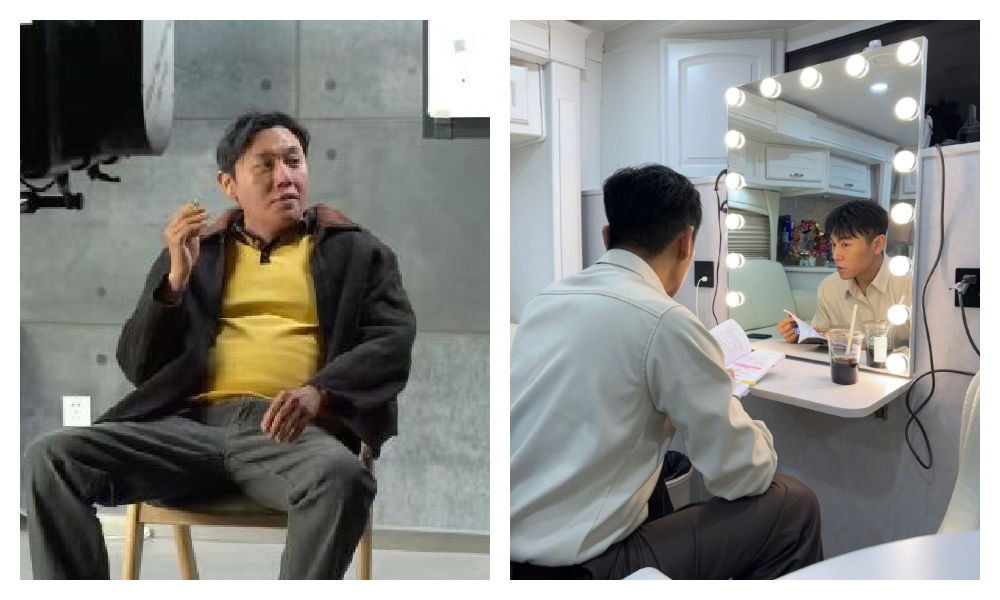
Qin before (left) and after (right) following the diet plan. Photos from Yi Nengjing’s Weibo post.
On Weibo, many people trying out this diet are posting photos of their daily meals, resulting in dozens of photos of a single ear of corn being posted on the platform these days.

Many Chinese netizens are posting photos of corn – their entire meal according to day 2 of Qin Hao’s diet (images via Weibo.com).
Despite the supposed effectiveness of the diet, Yi also issued a warning to her followers. “I want to emphasize once again that I do not recommend this menu to anyone,” she wrote on Weibo. “The entire process is incredibly arduous, and Qin experienced weakness in his legs due to hunger for some days.”
Despite the warning, the menu still managed to attract a significant number of netizens willing to give it a try. With titles like “Challenging Qin Hao’s Diet Plan (挑战秦昊饮食法)” and “Losing 8 Pounds in Five Days (五天瘦八斤),” many people took to platforms such as WeChat, Bilibili, and Weibo to share videos, images and texts documenting their experiences with the same diet plan and the amount of weight they lost each day.
Among those who decided to try the diet plan was the renowned screenwriter and producer Yu Zheng (于正), known for his works such as “The Palace” (宫) and “The Story of Yanxi” (延禧攻略). Yu shared on his Weibo account that he successfully lost 10 pounds in just a few days by following Qin’s diet plan. In doing so, he also inspired others to give it a try.

Bilibili users sharing themselves practising Qin’s diet plan.
While some individuals recognize the extreme nature of Qin Hao’s diet plan, they have made modifications by adding carbohydrates and proteins on certain days or incorporating other “diet foods” like cucumbers or healthy snacks.
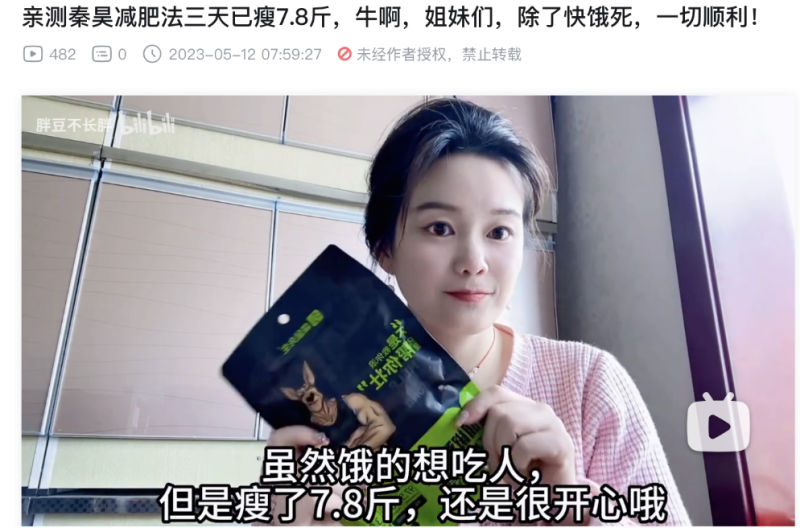
A user on Bilibili tried out Qin Hao’s diet plan and shared her experience. Although she admitted feeling “extremely hungry,” she said she lost almost 8 pounds and was “very pleased” with the outcome.
However, many choose to strictly adhere to the original plan, expressing sentiments such as “As long as I’m not starving to death, I’ll push myself to the limit” or “Even though I’m so hungry that I could eat a person, I’m still very happy with my progress.”
EXTREME CELEBRITY DIETS
“You are truly too fat.”
Qin is not the only celebrity whose weight loss journey has captured widespread attention. Earlier this year, another viral trend emerged among netizens, who urged director Guo Jingming (郭敬明) to establish a weight loss camp due to the noticeable weight loss among actresses who had worked on his film sets. On Weibo, this phenomenon was described as “no one can leave Guo Jingming’s film crew without losing weight” (“没有人能够胖着走出郭敬明剧组”).
Guo later disclosed his diet plan for actors and actresses during a television program. According to Guo, they were required to adhere to a diet that excluded oil, salt, and sugar. Additionally, he admitted that he would tell them “you are truly too fat (你真的太胖了)” on a daily basis, as a form of persuasion for those who were reluctant to follow the diet plan. Despite the extreme nature of this diet and his ‘brainwashing’ methods, many individuals continued to express their desire for Guo to realize an actual weight loss camp for them to join.
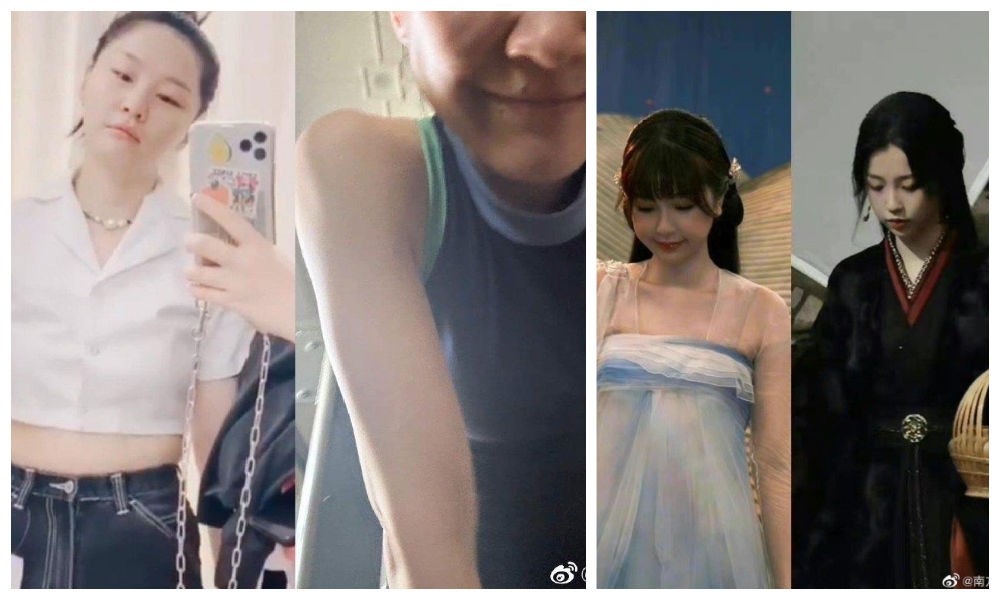
Weibo users compared photos of actresses Yu Shuxin and Jin Jing before and after joining Guo’s film crew to illustrate the effectiveness of Guo’s diet plan. The post where the above photos come from simply said: “I want to go! (想去!)” after the hashtag “#Guo Jingming film crew diet camp #郭敬明剧组减肥营#.
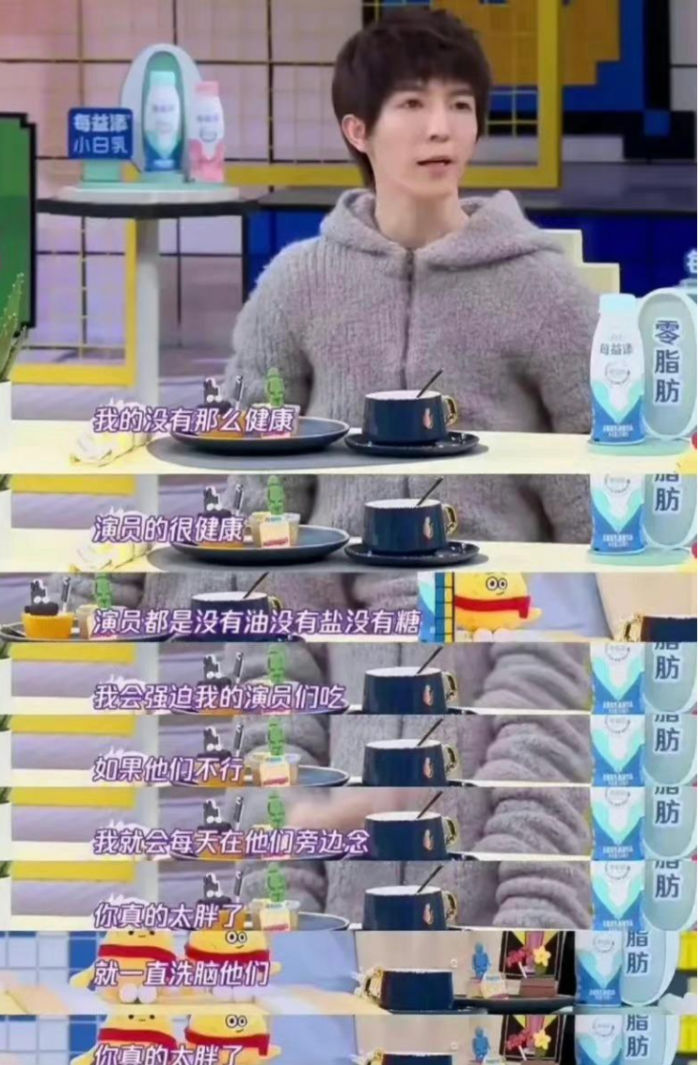
Guo reveals his way of helping actors lose weight (source).
The trend of following celebrity diets for weight loss remains popular, with an increasing number of individuals adopting the diet plans promoted by celebrities like Yu Shuxin, IU, Zhang Tianai, and others.
These diets come in various forms, ranging from single-food diets like cucumber and egg or boiled broccoli with plain porridge, to more restrictive approaches that eliminate specific ingredients, such as carbohydrates, or advocate for skipping evening meals. The widespread popularity of these diets is evident on social media, where netizens, mostly female, try them out and document their weight-loss journeys, sharing their progress with a wider audience.

Screenshot of the cover photo of one video on Bilibili introducing Yu Shuxin’s diet plan, which has been played over 150,000 times. The title says “Yu Shuxin’s way of losing 20 pounds’ weight. Revealing the diet plan to make your body easy to slim down! Losing 10 pounds in 10 days!”
The majority of posts and short videos revolving around these diet plans often feature attention-grabbing titles like “losing xx pounds in xx days,” accompanied by celebrities showcasing their slimmed body shapes.
CONCERNS SURROUNDING CELEBRITY CRASH DIETS
“Let me advise you: never, ever go down this terrible path.”
With the increasing popularity of celebrity diets, concerns about their impact on (mental) health have arisen. Doctors have issued warnings against attempting Qin Hao’s diet plan, cautioning that it can cause significant harm to the body and result in weight gain once discontinued.
Diets that severely restrict calorie intake, like this one, can have detrimental effects such as weakened immunity, decreased bone density, impaired memory, hair loss, and an increased risk of depression. Netizens commenting on posts of people trying these diets often warn others against blindly following their lead. One user offered a stern warning, saying: “To my sisters who haven’t started dieting, let me advise you: never, ever go down this terrible path.”
Despite the prevailing health concerns associated with celebrity diets, not everyone places their well-being above achieving a desired body shape. In response to a diet plan video by Kpop singer IU, one user acknowledged the potential harm it could cause but still said losing weight was their primary goal, as being overweight made them feel miserable: “I don’t care if it’s harmful to my body, as long as I can lose weight.”
Other users argue that everyone has the right to do whatever they want with their body: “We are all adults and responsible for our own affairs. If you want to lose weight, eat less. If you don’t want to lose weight, then continue to be overweight.”
PURSUIT OF THE PERFECT BODY
“For female celebrities, being fat destroys everything.”
Behind the never-ending new celebrity diet plans is the question of why celebrities losing weight garners such significant attention. It appears that shedding pounds has become a convenient method for celebrities to attract public interest and enhance their overall image. Losing weight is often portrayed as a symbol of willpower and dedication to one’s career.
For instance, Yuan Shanshan, who previously faced criticism for her appearance in certain TV series, received applause and positive attention after slimming down and achieving a V-line figure. Media reports frequently associate female celebrities’ dietary practices with the concept of “self-discipline,” utilizing titles such as “How self-disciplined are female celebrities?” to highlight their various weight-loss approaches.
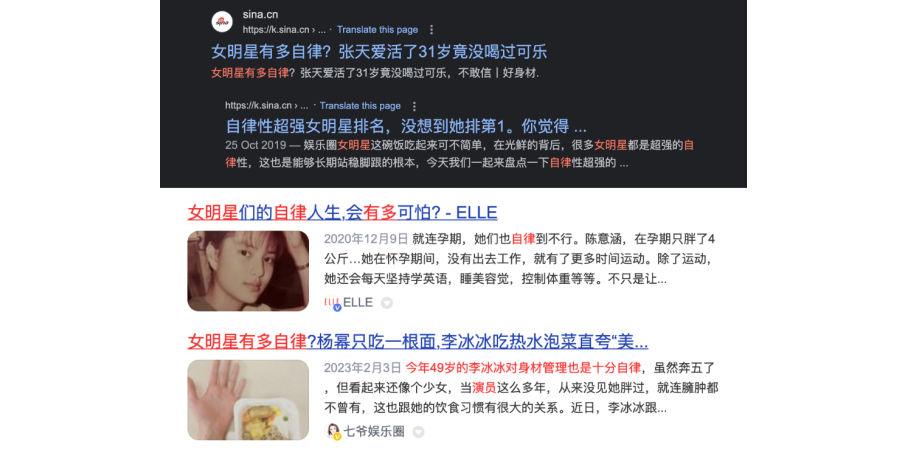
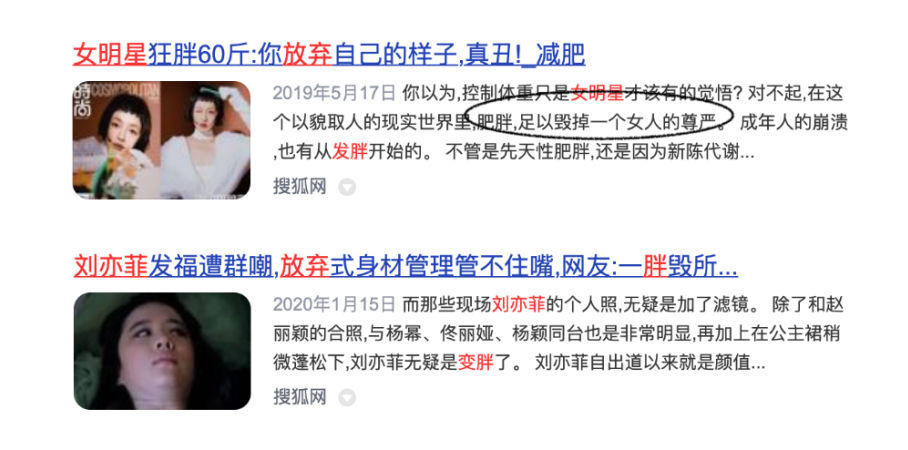
Articles perpetuating body shaming comments towards female celebrities for weight gain. Headlines employing phrases like “the image of you giving up yourself is ugly” and “being fat destroys everything” depict weight gain negatively. The highlighted sentence emphasizes the damaging impact of being fat on a woman’s self-esteem.
On the other hand, when female celebrities gain weight, they are often accused of “betraying” their professional careers or “giving up” on their ambitions.
A quick online search reveals how numerous news articles and blog titles highlight female celebrities’ self-discipline through their successful weight loss. These pieces often showcase extraordinary diet methods, like relying on single strands of noodle as a carbohydrate source or consuming plain, boiled vegetables without any additional ingredients.
SLIM LIKE A CELEBRITY
“Will your boss promote you because you’re as thin as a celebrity?”
The public’s scrutiny of celebrities’ weight, often using it as a measure of willpower and success, is a common phenomenon, but celebrities themselves also influence the public’s perception of the ‘perfect’ figure. On various variety shows, female celebrities’ heights and weights are increasingly showcased, which inadvertently contributes to viewers’ anxieties about their own bodies.
Articles on social media treat these measurements as if they represent the standard for the majority, presenting titles such as “After looking at the heights and weights of these female celebrities, I swear I will never eat again,” or “The true heights and weights of female celebrities – a reference for weight loss,” and: “How light is thin? Revealing female celebrities’ heights and weights.” These articles contribute to the idolization of specific body shapes and weights as symbols of beauty and perfection.
‘Am I too fat weighing xx pounds?’ ‘What weight is considered “fat” in today’s society?’ ‘Why do people care about women’s weight so much?’ ‘Why am I so obsessed with my own weight?’ As women track and critique the weight fluctuations of female celebrities, many are grappling with questions about body image on social media. They seek answers to their own concerns, shaped by constant exposure to the seemingly ideal body weights of these celebrities.
Amidst all the celebrity weight craze, more critical voices are emerging in the Chinese social media sphere. Witnessing people blindly following celebrities’ weight loss journeys, one Zhihu user recently wondered: “Why should everyone strive to have the same bodies as the ones displayed by celebrities? Is there any tangible benefit for ordinary individuals to achieve the same level of thinness as these celebrities? Will your boss promote you or increase your salary simply because you’re as slim as a celebrity?”
Many individuals also question the connection between weight loss, self-discipline, and professional success. They assert that celebrities’ ability to maintain a slim figure is predominantly driven by financial incentives rather than exceptional personal qualities.
One Weibo user commented on Qin Hao’s diet plan, highlighting the disparities between celebrity lifestyles and those of everyday individuals: “Most people don’t have jobs that demand such extreme measures, nor do they lead a celebrity lifestyle with chauffeured transportation and dedicated services for nutrition and exercise management. Furthermore, everyday individuals don’t need to rely on weight loss as a means to seek public attention or stay in the spotlight.”
Chinese author Mao Li (毛利), in a Zhihu post, shared her perspective on the issue and acknowledged that she also has wasted valuable time on futile body image anxieties. She suggests breaking free from the media’s “perfect body” hype, embracing self-acceptance, and finding joy in living together with our bodies. She encourages people to “accept it, enjoy it, and praise it.”
By Zilan Qian
Get the story behind the hashtag. Subscribe to What’s on Weibo here to receive our newsletter and get access to our latest articles:
Spotted a mistake or want to add something? Please let us know in comments below or email us. First-time commenters, please be patient – we will have to manually approve your comment before it appears.
©2023 Whatsonweibo. All rights reserved. Do not reproduce our content without permission – you can contact us at info@whatsonweibo.com.
Zilan Qian is a China-born undergraduate student at Barnard College majoring in Anthropology. She is interested in exploring different cultural phenomena, loves people-watching, and likes loitering in supermarkets and museums.

Also Read
China Arts & Entertainment
Jia Ling Returns to the Limelight with New “YOLO” Movie and 110-Pound Weight Loss Announcement
After a year away from the spotlight, Chinese actress and director Jia Ling is back, announcing both a new film and slimmer figure.
Published
7 months agoon
January 11, 2024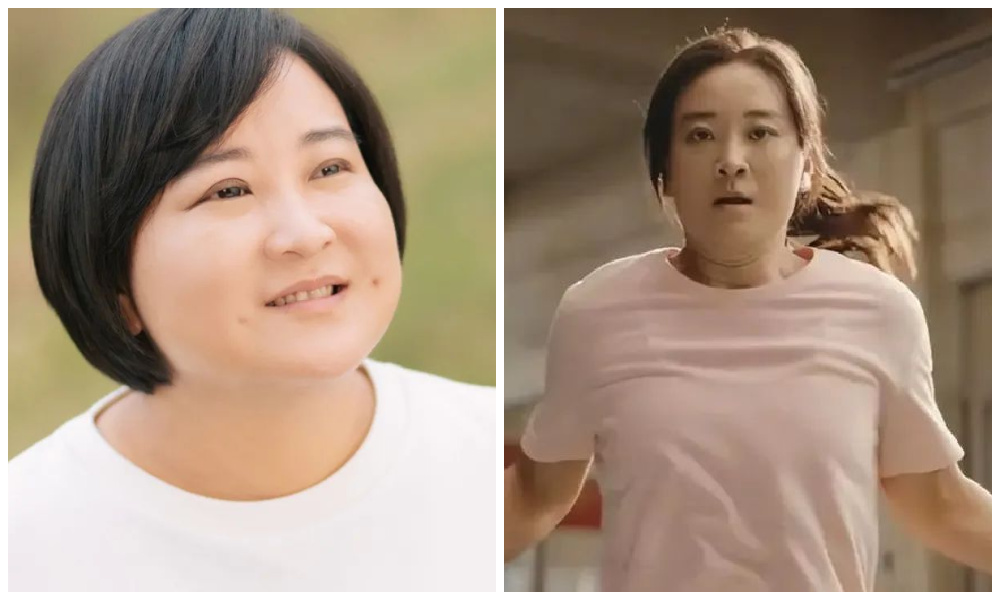
Chinese actress and director Jia Ling (贾玲) has been trending on Weibo thanks to her upcoming film YOLO (热辣滚烫) and her remarkable weight loss transformation.
Jia Ling is a famous Chinese comedian actress, known for her annual Spring Festival Gala performances. She has been especially successful in the previous years as she made her directorial debut in 2021 with the award-winning box office hit Hi, Mom (Chinese title Hi, Li Huanying 你好,李焕英), in which she also stars as the female protagonist. That same year, audiences saw her as Wu Ge in Embrace Again (穿过寒冬拥抱你).
It has been a while since we’ve heard from Jia Ling, but on January 11, she resurfaced with a Weibo post in which she explained her absence from the limelight.
In her post, Jia wrote that she has spent the entire year working on the YOLO (热辣滚烫) movie, for which she lost a staggering 100 jin (斤) (110 lbs/50 kg). Just as with Hi, Mum, Jia is both the director of YOLO and the lead actress.
According to Jia, it was a tiring and “hungry” year, during which she ended up “looking like a boxer.” She added that the movie, set to premiere during the Spring Festival, is not necessarily about weight loss at all, but about learning to love yourself.
Within a single day, Jia Ling’s post received nearly 60,000 replies and over 855,000 likes.

Jia Ling’s post on Weibo.
The topic became top trending due to various reasons. It is because fans are excited to see Jia Ling back in the limelight and are anticipating the upcoming movie, but also because they are eager to see Jia Ling’s transformation.
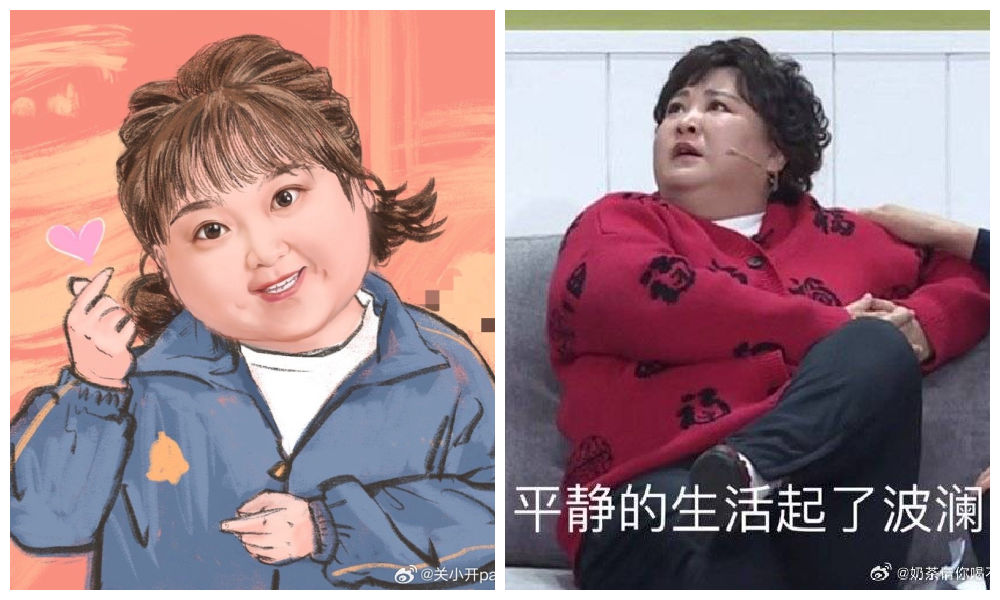
From fans on Weibo: Jia Ling fanart and a meme from one of her well-known Spring Festival performances.
A short scene from the movie showed Jia Ling’s slimmer appearance, and a screenshot of it went viral, with Weibo users saying they hardly recognized Jia anymore.
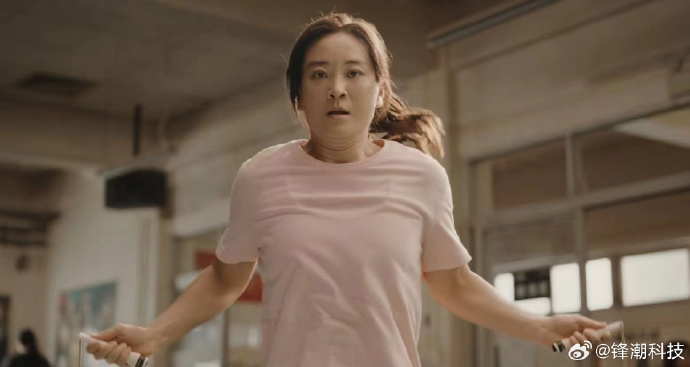
One hashtag related to Jia Ling’s weight loss, about expert views on losing so much weight in such a relatively short time, received over 450 million on Weibo on Thursday (#医生谈贾玲整容式暴瘦#).
Perhaps unsurprisingly, medical experts quoted by Chinese media outlets caution against rapid weight loss methods, recommending a more gradual approach instead.
Nevertheless, there is great interest in the extreme diets of Chinese celebrities. As discussed in an earlier article about China’s celebrity weight craze, the weight loss journey of Chines actors or influencers often capture widespread attention as people are keen to adopt diet plans promoted by celebrities.
YOLO (热辣滚烫), which will hit Chinese theaters on February 10, tells the story of Le Ying (乐莹), who has withdrawn from social life and isolated herself at home ever since graduation. Trying to get her life back on track, Le Ying meets a boxing coach. The meeting proves to be just the beginning of a new journey in life filled with unforeseen challenges.
The Spring Festival holiday typically sees peak box office numbers in China, making this movie highly anticipated, particularly after the success of Hi, Mum three years ago. On Weibo, many view Jia Ling’s weight loss as a testament to her dedication and are eager to see the results of her year-long efforts in the cinema next month.
By Manya Koetse
Get the story behind the hashtag. Subscribe to What’s on Weibo here to receive our newsletter and get access to our latest articles:
Spotted a mistake or want to add something? Please let us know in comments below or email us. First-time commenters, please be patient – we will have to manually approve your comment before it appears.
©2024 Whatsonweibo. All rights reserved. Do not reproduce our content without permission – you can contact us at info@whatsonweibo.com.
China Celebs
Three Reasons Why Lipstick King’s ‘Eyebrow Pencil Gate’ Has Blown Up
From beauty guru to betrayal: why one livestream moment is shaking China’s internet.
Published
11 months agoon
September 13, 2023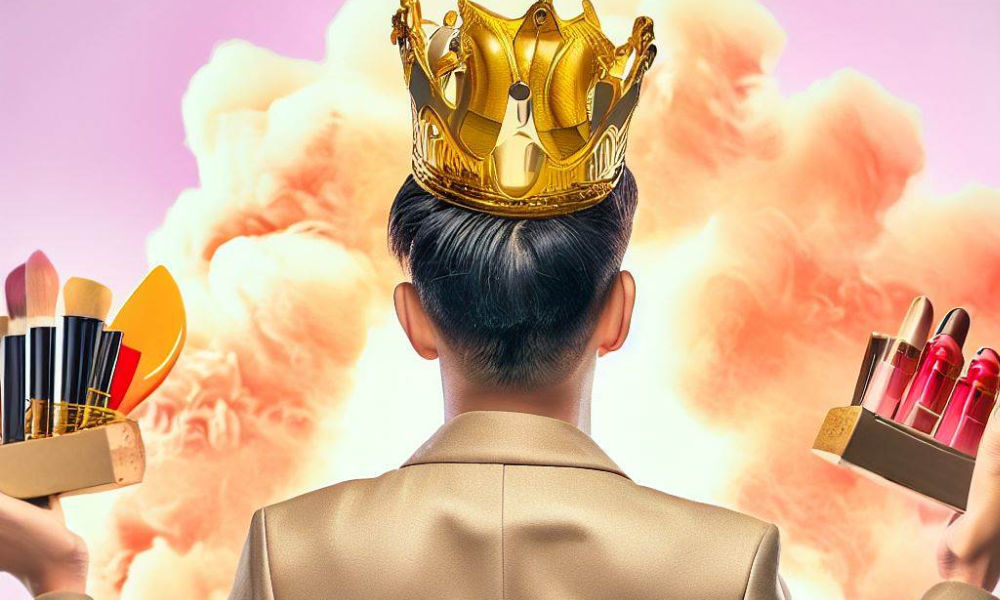
PREMIUM CONTENT
Li Jiaqi, also known as Austin Li the ‘Lipstick King,’ has become the focus of intense media attention in China over the past days.
The controversy began when the popular beauty influencer responded with apparent annoyance to a viewer’s comment about the high price of an eyebrow pencil. As a result, his fans began unfollowing him, netizens started scolding him, Chinese state criticized him, and the memes started flooding in.
Li Jiaqi’s tearful apology did not fix anything.
We reported about the incident here shortly after it went trending, and you can see the translated video of the moment here:
China's famous make-up influencer #LiJiaqi is in hot water due to an e-commerce livestream he did on Sunday. When viewers complained about an eyebrow pencil being too expensive (79 RMB/$10.9), he got annoyed, insisting that the product was not expensive at all. Translated video: pic.twitter.com/JDKGMKovDX
— Manya Koetse (@manyapan) September 11, 2023
The incident may seem minor at first glance. Li was merely promoting Florasis brand (花西子) eyebrow pencils, and some viewers expressed their opinion that the pencils, priced at 79 yuan ($11), had become more expensive.
In response, Li displayed irritation, questioning, “Expensive how?” He went on to suggest that viewers should also reflect on their own efforts and whether they were working hard enough to get a salary increase.
But there is more to this incident than just an $11 pencil and an unsympathetic response.
#1 The King Who Forgot the People Who Crowned Him
The initial reaction of netizens to Li Jiaqi’s remarks during the September 10th livestream was characterized by a strong sense of anger and disappointment.
Although celebrities often face scrutiny when displaying signs of arrogance after their rise to fame, the position of Li Jiaqi in the wanghong (internet celebrity) scene has been especially unique. He initially worked as a beauty consultant for L’Oreal within a shopping mall before embarking on his livestreaming career through Alibaba’s Taobao platform.
In a time when consumers have access to thousands of makeup products across various price ranges, Li Jiaqi established himself as a trusted cosmetics expert. People relied on his expertise to recommend the right products at the right prices, and his practice of personally applying and showcasing various lipstick colors made him all the more popular. He soon garnered millions of online fans who started calling him the Lipstick King.
By 2018, he had already amassed a significant fortune of 10 million yuan ($1.53 million). Fast forward three years, and his wealth had ballooned to an astonishing 18.5 billion yuan ($2.5 billion).
Despite his growing wealth, Li continued to enjoy the support of his fans, who appreciated his honest assessments of products during live testing sessions. He was known for candidly informing viewers when a product wasn’t worth buying, and the story of his humble beginnings as a shop assistant played a major role in why people trusted him and wanted him to succeed.
However, his recent change in tone, where he no longer seemed considerate of viewers who might find an $11 brow pencil to be expensive, suggests that he may have lost touch with his own customer base. Some individuals perceive this shift as a form of actual “betrayal” (背叛), as if a close friend has turned their back on them.

The viral cartoon shows Li Jiaqi going from a friendly beggar to angry rat.
One cartoon shared on social media shows Li Jiaqi, with mouse ears, as he initially begs his online viewers for money. However, as he becomes more prosperous, the cartoon portrays him gradually growing arrogant and eventually scolding those who helped him rise to fame.
Many people accuse Li of being insincere, suggesting that he revealed his true colors during that short livestream moment. This is also one of the reasons why most commenters say they do not believe his tears during his apology video.
“He betrayed China’s working class,” one popular vlog suggested.
#2 Internet Celebrity Crossing the Lines
Another reason why the incident involving Li Jiaqi is causing such a storm is related to the media context in which Chinese (internet) celebrities operate and what is expected of them.
Whether you are an actor, singer, comedian, or a famous livestreamer/e-commerce influencer, Chinese celebrities and performers are seen as fulfilling an exemplary role in society, serving the people and the nation (Jeffrey & Xu 2023). This is why, as explained in the 2019 research report by Jonathan Sullivan and Séagh Kehoe, moral components play such a significant role in Chinese celebrity culture.
In today’s age of social media, the role of celebrities in society has evolved to become even more significant as they have a vast reach and profound influence that extends to countless people and industries.
Their powerful influence makes celebrities important tools for authorities to convey messages that align with their goals – and definitely not contradict them. Through the media and cultural industries, the state can exert a certain level of control within the symbolic economy in which celebrities operate, as discussed by Sullivan and Kehoe in their 2019 work (p. 242).
This control over celebrities’ actions became particularly evident in the case of Li Jiaqi in 2022, following the ‘cake tank incident’ (坦克蛋糕事件). This incident unfolded during one of his livestreams when Li Jiaqi and his co-host introduced a chocolate cake in the shape of a tank, with an assistant in the back mentioning something about the sound of shooting coming from a tank (“坦克突突”). This livestream took place on June 3rd, on the night before the 33rd anniversary of the crackdown on the Tiananmen protests.
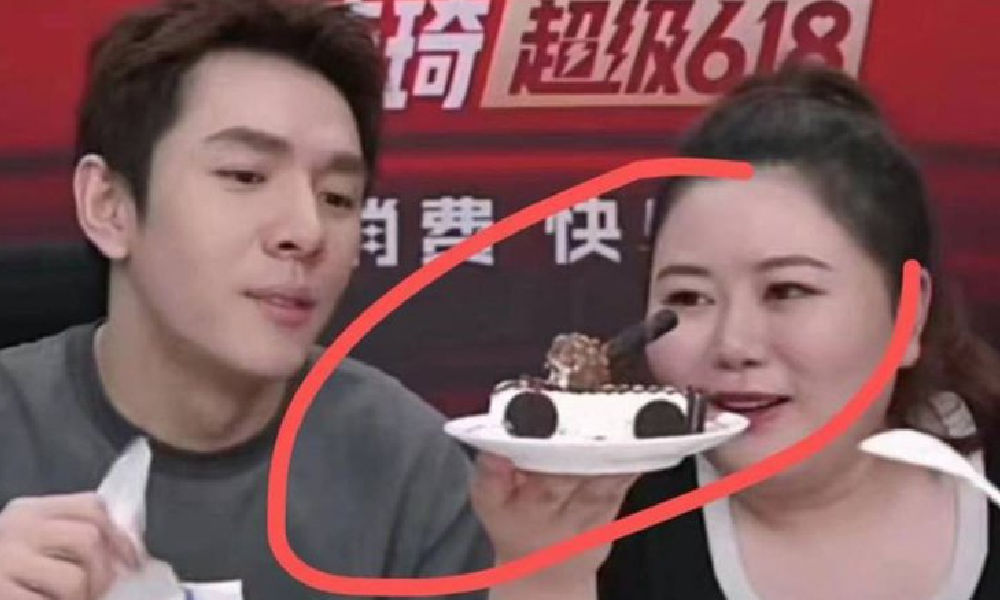
While Li Jiaqi did not directly touch upon a politically sensitive issue with his controversial livestream, his actions were perceived as a disregard for customer loyalty and displayed an arrogance inconsistent with socialist core values. This behavior garnered criticism in a recent post by the state media outlet CCTV.
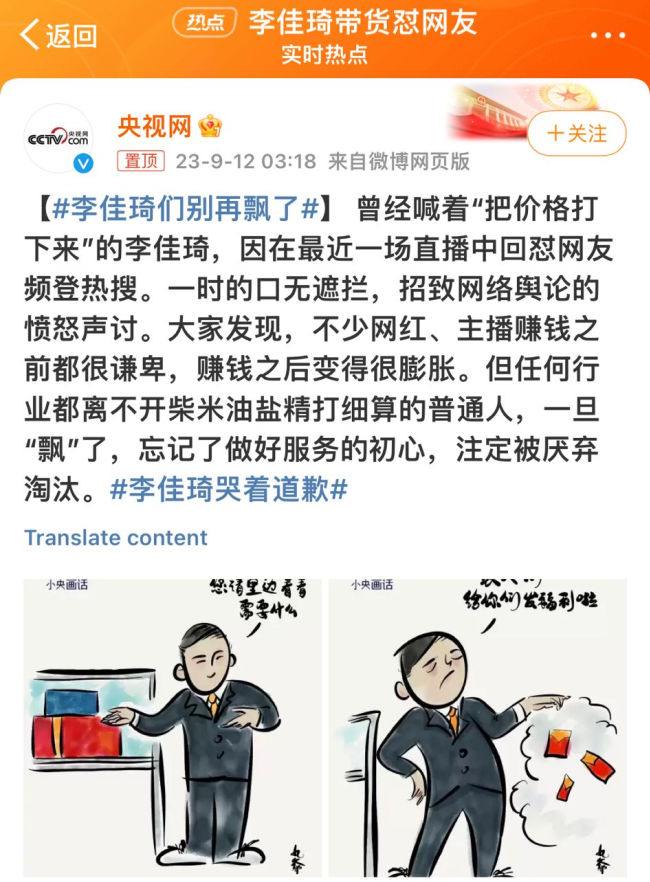
Post by CCTV condemning Li’s behavior.
Other state media outlets and official channels have joined in responding to the issue, amplifying the narrative of a conflict between the ‘common people’ and the ‘arrogant influencer.’
#3 Striking a Wrong Chord in Challenging Times
Lastly, Li Jiaqi’s controversial livestream moment also became especially big due to the specific words he said about people needing to reflect on their own work efforts if they cannot afford a $11 eyebrow pencil.
Various online discussions and some media, including CNN, are tying the backlash to young unemployment, tepid consumer spending, and the ongoing economic challenges faced by workers in China.
Since recent years, the term nèijuǎn (‘involution’, 内卷) has gained prominence when discussing the frustrations experienced by many young people in China. It serves as a concept to explain the social dynamics of China’s growing middle class who often find themselves stuck in a “rat race”; a highly competitive education and work environment, where everyone is continually intensifying their efforts to outperform one another, leading to this catch 22 situation where everyone appears to be caught in an unending cycle of exertion without substantial progress (read more here).
Weibo commenters note that, given China’s current employment situation and wage levels, hard work is not necessarily awarded with higher income. This context makes Li Jiaqi’s comments seem even more unnecessary and disconnected from the realities faced by his customers. One Shanghai surgeon responded to Li’s comments, saying that the fact that his salary has not increased over the last few year certainly is not because he is not working hard enough (#上海胸外科医生回应李佳琦言论#).
Some observers also recognize that Li, as an e-commerce professional, is, in a way, trapped in the same cycle of “inversion” where brands are continuously driving prices down to such low levels that consumers perceive it as the new normal. However, this pricing strategy may not be sustainable in the long run. (Ironically, some brands currently profiting from the controversy by promoting their own 79 yuan deals, suggesting their deal is much better than Li’s. Among them is the domestic brand Bee & Flower 蜂花, which is offering special skin care products sets for 79 yuan in light of the controversy.)
Many discussions therefore also revolve around the question of whether 79 yuan or $11 can be considered expensive for an eyebrow pencil, and opinions are divided. Some argue that people pay much more for skincare products, while others point out that if you were to weigh the actual quantity of pencil color, its price would surpass that of gold.
The incident has sparked discussions about the significance of 79 yuan in today’s times, under the hashtag “What is 79 yuan to normal people” (#79元对于普通人来说意味着什么#).
People have shared their perspectives, highlighting what this amount means in their daily lives. For some, it represents an entire day’s worth of home-cooked meals for a family. It exceeds the daily wages of certain workers, like street cleaners. Others equate it to the cost of 15 office lunches.

One netizen posts 79 yuan ($10.9) worth of groceries.
Amid all these discussions, it also becomes clear that many people are trying to live a frugal live in a time when their wages are not increasing, and that Li’s comments are just one reason to vent their frustrations about the situation they are in, In those regards, Li’s remarks really come at a wrong time, especially coming from a billionaire.
Will Li be able to continue his career after this?
Some are suggesting that it is time for Li to take some rest, speculating that Li’s behavior might stem from burn-out and mental issues. Others think that Li’s hardcore fans will remain loyal to their e-commerce idol.
For now, Li Jiaqi must tread carefully. He has already lost 1.3 million followers on his Weibo account. What’s even more challenging than regaining those one million followers is rebuilding the trust of his viewers.
Update: On September 19, the Florasis/Huaxizi brand finally apologized for its late response to the controversy, and the brand stated that the controversy provided an opportunity for them to listen to “the voice of their consumers.” Their decision to release a statement seemed fruitful: they gained 20,000 new followers in a night.
By Manya Koetse
with contributions by Miranda Barnes
Jeffreys, Elaine, and Jian Xu. 2023. “Governing China’s Celebrities.” Australian Institute of International Affairs, 18 May https://www.internationalaffairs.org.au/australianoutlook/governing-chinas-celebrities/ [12 Sep 2023].
Sullivan, Jonathan, and Séagh Kehoe. 2019. “Truth, Good and Beauty: The Politics of Celebrity in China.” The China Quarterly 237 (March): 241–256.
Spotted a mistake or want to add something? Please let us know in comments below or email us. First-time commenters, please be patient – we will have to manually approve your comment before it appears.
©2023 Whatsonweibo. All rights reserved. Do not reproduce our content without permission – you can contact us at info@whatsonweibo.com.
Subscribe

Weibo Watch: The Future is Here

“Bye Bye Biden”: Biden’s Many Nicknames in Chinese

Enjoying the ‘Sea’ in Beijing’s Ditan Park

A Triumph for “Comrade Trump”: Chinese Social Media Reactions to Trump Rally Shooting

Weibo Watch: Get Up, Stand Up

The Tragic Story of “Fat Cat”: How a Chinese Gamer’s Suicide Went Viral

“Old Bull Eating Young Grass”: 86-Year-Old Chinese Painter Fan Zeng Marries 36-Year-Old Xu Meng

A Brew of Controversy: Lu Xun and LELECHA’s ‘Smoky’ Oolong Tea

Singing Competition or Patriotic Fight? Hunan TV’s ‘Singer 2024’ Stirs Nationalistic Sentiments

Zara Dress Goes Viral in China for Resemblance to Haidilao Apron

Weibo Watch: The Battle for the Bottom Bed

About the “AI Chatbot Based on Xi Jinping” Story

China’s Intensified Social Media Propaganda: “Taiwan Must Return to Motherland”

Weibo Watch: Telling China’s Stories Wrong

Saying Goodbye to “Uncle Wang”: Wang Wenbin Becomes Chinese Ambassador to Cambodia
Get in touch
Would you like to become a contributor, or do you have any tips or suggestions? Get in touch here!
Popular Reads
-

 China Insight3 months ago
China Insight3 months agoThe Tragic Story of “Fat Cat”: How a Chinese Gamer’s Suicide Went Viral
-

 China Music4 months ago
China Music4 months agoThe Chinese Viral TikTok Song Explained (No, It’s Not About Samsung)
-

 China Digital10 months ago
China Digital10 months agoToo Sexy for Weibo? Online Discussions on the Concept of ‘Cābiān’
-

 China Arts & Entertainment12 months ago
China Arts & Entertainment12 months agoBehind 8 Billion Streams: Who is Dao Lang Cursing in the Chinese Hit Song ‘Luocha Kingdom’?




